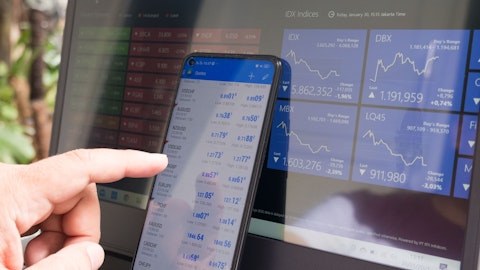Lawrence Kurzius: Well, I will say that, that is a wide-ranging question, and I can go absolutely while answering it. However, we have gotten rid of some — when I say when we said we’re pruning the business, I mean, some of it is not visible, as we talked about on a previous question. But some of it is Kitchen Basics, for example, is a brand that — well, it’s a great brand. We like it a lot. It was the only thing we had in that aisle. It was hard for us to bring our category management tools to bear on it and it was a little bit of an orphan. There was pressure both from leading brands and from private label on that. And we didn’t see a good path to grow it with a good return for us, the wrong owner of that brand. And so we’ve thought about other parts of our portfolio that way.
The things that we’ve gotten out of have tended to be pretty small, though. And that’s a good example of one of the bigger things that we’ve done. Most of what we — the other things we’ve gotten out of have been small or would be less familiar to you because they’re in a different region of the world. But the innovation that we will do is differentiated. It brings more differentiation to our brand, flavors, blends that are hard to duplicate. We brought on a technology into some of our innovation as we have with the true taste technology that we are using in our new stubs rugs. And I think we just had a tough act to follow. And the renovation that we’re doing on our core herbs and spice brands is going to be very differentiating, not just versus private label, but versus other brands.
I mean to be able to have that oxygen-free atmosphere that is going to bring freshness to the market and a better appearance and aroma for consumers, that is going to be very differentiating and difficult to follow quickly. That’s for sure. And a lot of the things that we’re doing around that renovation are either trademarked or patented. And I think — I mean, I think that everything you look at, whether it’s the pruning of our portfolio or the migration of our portfolio to higher value or technically insulated products on the Flavor side, to the innovation that we’re bringing in our brands, serves to differentiate us, extend our leadership and push the gap between us and private label to be more of a discussion around total value and cost and benefits than just about the cheapest price.
Brendan Foley: And we really love the categories we’re in, whether it’s or Frank’s RedHot, things like that. So, it’s — we’ve intentionally picked these categories.
Lawrence Kurzius: Thanks for your question. And that is our final question. So, I was waiting for the moderator to possibly say something, but that’s okay. It’s not necessary. But core alignment with consumer trends and the rising demand for Flavor in combination with the breadth and reach of our global portfolio and our strategic investments provide a strong foundation for sustainable growth. We are disciplined and our focus on the right opportunities and investing in our business. We’re continuing to drive further growth as we successfully execute on our long-term strategy, actively respond to changing consumer behavior and capitalize on opportunities from our relative strength. We continue to be well positioned for continued success and remain committed to driving long-term value for our shareholders.
Kasey Jenkins: Thank you, Lawrence, and thank you to everybody for joining today’s call. If you have any other questions, please follow-up. Please feel free to contact me. This concludes this earnings call. Thank you all, and have a great day.
Follow Mccormick & Co Inc (NYSE:MKC)
Follow Mccormick & Co Inc (NYSE:MKC)
Receive real-time insider trading and news alerts





